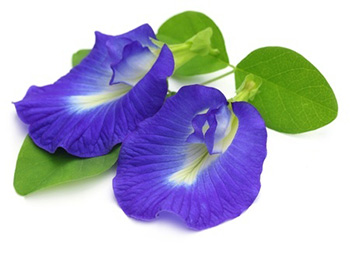Shankhpushpi (Convolvulus Pluricaulis)

Description Of Plant
It is a perennial herb with a small woody and branched rootstock which 4 to 12 inches long, densely hairy. The branches rise up to some extent and then spread on the ground and on grass. The leaves are 0.5 inches to 1.5 inches long. The petiole is minute and the base is acute. The flower wears the wide and shiny upper parts, and smells like radish if it is rubbed. The flowers are white, pink or thick rose color. It has funnel shaped rounds and blackish or brownish colored seeds. The entire bush appears like black plum or grey color.
In the rainy season this plant can be found naturally on rocky and fallow lands in India. Due the color distinction in the flowers, it can be divided into three categories. 1. White 2. Blue 3. Canscora decussate (Gentianaceac). This plants also named as Shankhahuli.
General Information
In Ayurveda, Shankhpushpi is considered as famous Ayurvedic medicine for improving the memory and intelligence. It helps to rejuvenate the mind and Use of this herb is also in other problems like vomiting and toxicity. It has also been used since many years in the treatment of disorders such as anxiety, hypertension, neurosis, stress, insomnia, asthma, bronchitis, cerebral abnormalities, epilepsy, edema, urinary disorders and constipation. Moreover use of this herb is quite good in the treatment neurodegenerative diseases like Alzheimer and dementia etc.
Whole plant part is packed with medicinal properties. Chemical studies of whole plant have shown the presence of glycosides, coumarins, flavonoids and alkaloids, sitosterol glycoside, hydroxy cinnamic acid, octacosanol tetracosane and sucrose. These phytochemical compounds exhibit the various therapeutic properties for the treatment of various ailments.
Habitat
Commonly growing throughout India and also cultivated.
Classification
- Kingdom: Plantae
- Division: Magnoliophyta
- Class: Magnoliopsida
- Order: Solanales
- Family: Gentianaceae
- Genus: Convolvulus
- Species: pluricaulis
Names
- Latin Name - Convolvulus pluricaulis
- Hindi Name - Sankhahul, Shankhahuli
- Sanskrit Name - Shankhava, Shankhpushpi, Ksheerapushpi, Mangala Kusuma
- Telugu Name - Sankhapuspi
- Marathi Name - Sankhvel
- Gujarati Name - Sankhavali
- English Name - English speedwheel
- Urdu Name - Sankali
Ayurvedic Properties
| Hindi / Sanskrit | English | ||
| Rasa | Tikta | Taste | Bitter |
| Guna | Snigdha, Picchila | Physical Property | Oily, sticky |
| Virya | Sheeta | Potency | Cold |
| Vipaka | Madhura | Metabolic Property (After Digestion) | Sweet |
Effects On Doshas
It balances pitta and kapha doshas.
Classical Categorization
| Charak Samhita | Sushrut Samhita | Vagbhata |
| Nil | Nil | Nil |
Ancient Verse About Convolvulus Pluricaulis

The Bhavprakash nighantu, edition of 2010: verse 269-270, page no-454.
Shankpushpi, Shakhhava, Manglay and Kusuma are the synonyms of Shankhpushpi. It is astringent in taste, with hot potency and is good for intellect, eye diseases and mental disorders. It is good for memory, rejuvenation, skin glow and epilepsy, psychological disorders like hysteria, leprosy, worms and toxins.
References
The Bhavprakash nighantu with elaborated Hindi commentary by Padmashri prof. K.C. Chunekar, edited by Dr. G.S. Pandey: verse 269-270, edition of 1998: page no- 454.
Practical Uses Of Convolvulus Pluricaulis
- In Ayurveda, shankhpushpi is considered as an amazing brain tonic which helps to enhance the learning, memory, intelligence and retain better. Moreover it is herb which helps to rejuvenate the brain.
- It has also been used since ages in the treatment of disorders such as hypertension, anxiety, neurosis, stress, insomnia, asthma, bronchitis, cerebral abnormalities, epilepsy, edema, urinary disorders, constipation and very dangerous and tricky brain (essentially neurodegenerative) diseases like Alzheimer and dementia etc.
- Use of this herb is good to manage the problem of vertigo. This herb helps to calm the nervous system. It also provides relief in the symptoms associated with vertigo like headache, anxiety, stress and brain complications.
- This is known to be a good herb in the treatment of respiratory complications like common cold, cough, asthma and bronchitis. It helps to clear the air channels and also enhances immunity to fight against the various viral or bacterial infections.
- Use of this herb is very beneficial in the treatment of urogenital disorders. It helps to provide relief in the symptoms like painful urination, swelling of urethra, burning sensation etc.
- This herb possess the spermatogenic properties. In males it helps to enhance sperm production and also improves the quality of sperms too.
- This herb is good to manage the insomnia and sleeping disorders in people.

